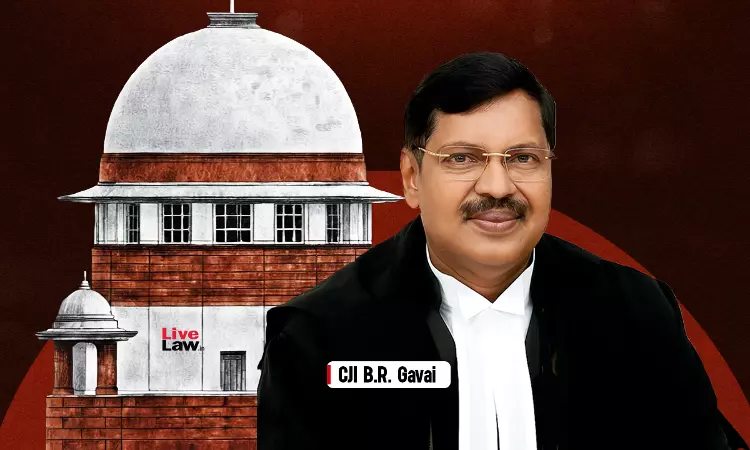CJI Calls For Central Agency To Filter Government Appeals Before Filing In Order To Reduce Pendency
Amisha Shrivastava
20 Sept 2025 4:48 PM IST

Chief Justice of India Justice Bhushan Ramkrishna Gavai on Saturday called for a Central agency to filter which judgments the government appeals before courts in order to reduce the pendency of matters before the courts.
He was addressing the 10th All India Conference of the Central Administrative Tribunal (CAT), 2025.
Justice Gavai said that over one lakh cases are currently pending before the CAT and numerous others before State administrative tribunals. He noted that the Central government is the biggest litigant before the Supreme Court and High Courts, and that appeals are often filed even after concurrent findings of the CAT and the High Court.
“The bureaucrats are afraid to take the risk and they pass on the burden to the judiciary. Therefore, if there is some Central agency that filters which cases are to be appealed, it will greatly reduce the pendency of the matters before the court. As we know, the Central government is the biggest litigant before the Supreme Court as well as the High Court,” he said.
The CJI recalled his time in the Nagpur bench of Bombay High Court when directions were issued to appoint nodal officers in every department and collector office to scrutinise whether a matter deserved to be appealed. He said such a filter would help reduce pendency.
While emphasising that citizens' right to appeal is a cornerstone of justice, he said litigation spanning years undermines the purpose of establishing tribunals. He noted that many government officers reach retirement before their cases are resolved, creating significant professional and personal challenges.
Union Law Minister Arjun Ram Meghwal also criticised the practice of government departments filing appeals as a matter of routine even when the tribunal or court orders were legally sound. Meghwal stressed that this tendency of automatic appeals must be addressed.
Justice Gavai underlined the achievements of the CAT since its inception, stating that it was designed to improve efficiency and access to justice for government officials. He cited the Law Commission's 272nd report and noted that CAT achieved a disposal rate of 94% compared to the number of cases instituted annually and maintained an admirable 91% disposal rate between 2015 and 2019. He said CAT has disposed of nearly 4 lakh of the 6 lakh cases instituted so far.
However, he said, statistics alone cannot be the sole measure of success. Factors such as consistency, transparency, and public faith must also be considered. He stressed the need for greater consistency in rulings and transparency in functioning, adding that decisions must be well reasoned as “the reasons are the live link between the consideration and result.”
Justice Gavai pointed out that administrative tribunals occupy a unique space between the executive and the judiciary, with members coming from both. He said while this diversity strengthens tribunals, it also requires consistent training and uniform standards of eligibility and conduct. Judicial members would benefit from exposure to public administration while administrative members need training in legal reasoning, he added.
Speaking candidly, the CJI said, “Nowadays you don't know what you say and what comes in the social media, but as a judge I have personally noticed that some of the judges coming from the administration do not forget that they come from the administration, and they are averse to passing any order which is against the government. So I think they should reflect on that.” He said regular workshops, conferences and training programmes can greatly enhance the effectiveness of tribunal members.
He further said that a uniform appointment process with clear eligibility criteria would address arbitrariness and strengthen credibility. He also flagged the need to improve service conditions of tribunal members to attract retired High Court judges and judicial officers to these posts.
“One of the issues that the government needs to address urgently is the service conditions of the members of the tribunal. If the government desires that the retired judges of the high court and good judicial officers should accept the offices of the tribunal a quick look at the service conditions of the chairpersons and the members of the tribunals is a need of the day”, he said.
Justice Gavai called for a centralised data platform for tribunals similar to the National Judicial Data Grid and National Justice Clock used for courts.
“However no such data grid exists for the tribunals. Although CAT provides a brief overview of pending, disposed and filed matters on its own page, a comprehensive resource where such data can be found for the central and State administrative tribunals could provide more uniformity in accessing data. It would also empower litigants to track their cases with greater ease. Such uniformity in data will also foster a culture of comparability among the tribunals, allowing policy makers, researchers and the court to identify best practices as well as areas which may require urgent attention. Such a database where tribunals regularly update the status of each case reviewed by them would also greatly improve the tribunal's sense of accountability and transparency”, the CJI said.
Justice Gavai concluded by saying that the Central Administrative Tribunal and its State counterparts have played a transformative role in reducing the burden of courts and improving access to justice. He expressed confidence that the conference would provide valuable insights and help improve the legitimacy of tribunals in the eyes of people.


